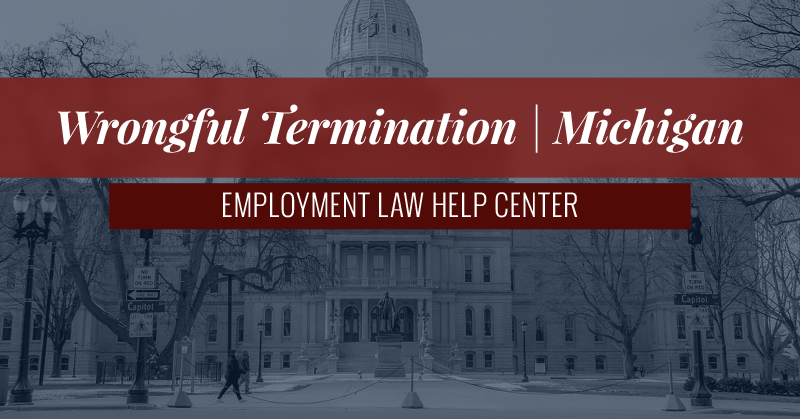Michigan Wrongful Termination
There are federal antidiscrimination laws in place that prohibit employers in Michigan from firing employees based on their membership in a protected class, in retaliation for asserting their rights as an employee, in breach of an employment contract, or for taking time off work to fulfill certain civic or personal obligations. There are also laws at the state level that provide further protections for Michigan employees, and it’s important to be aware of your rights in the event of a wrongful termination. If you lost your job in Michigan, and you believe your employer’s decision to fire you was discriminatory, retaliatory, or in violation of your employment contract, consult a knowledgeable employment law attorney to discuss the possibility of filing a wrongful termination claim against your employer.

At-Will Employment in Michigan
Like most other states, Michigan is an “at-will” employment state, which means employers have the right to fire an employee at any time and for any reason, or for no reason at all. However, there are exceptions to the at-will rule that prohibit employers from firing an employee for discriminatory reasons, in violation of an employment contract, or in retaliation for the employee exercising his rights.
Discriminatory Firing
There are state and federal laws in place, such as the Americans with Disabilities Act, Title VII of the Civil Rights Act of 1964, the Age Discrimination in Employment Act, and Michigan’s Elliott Larsen Civil Rights Act, that protect employees from discriminatory treatment in the workplace, or treatment that has a disproportionate adverse impact on members of a protected class, and this includes wrongful termination. Under Michigan labor law, employers are prohibited from firing an employee on the basis of a protected characteristic, or a characteristic shared by a group of people who are legally protected from harassment or discrimination on the basis of that characteristic. Protected characteristics in Michigan include the following:
- Race
- Color
- Age
- Religion
- Disability
- Height or weight
- National origin
- Marital status
- Sex
- Citizenship status
- Genetic information
- HIV/AIDS
- Misdemeanor arrest record

Retaliatory Firing
Another type of wrongful termination in Michigan is retaliatory firing, which may occur when an employer fires an employee for exercising his rights. For example, if you report workplace discrimination, against yourself or someone else, or if you participate in an investigation of a discrimination complaint, testify in court, or make other efforts stop discriminatory practices, it is illegal for your employer to fire you in retaliation for these actions. It is also illegal for an employer in Michigan to fire an employee for filing a workers’ compensation claim, for reporting illegal activity on behalf of the employer (whistleblowing), or for filing a complaint with human resources after being passed over for a promotion for discriminatory reasons.
Breach of Contract Firing
If you have an employment contract that promises you job security, you may not be considered an at-will employee, and your employer may be prohibited from firing you without cause. In Michigan, an employment contract can be written or oral, meaning your employer makes written or oral promises not to fire you for a certain period of time without good cause, or even implied, meaning your employer acts in a way that creates a reasonable expectation of job security.
Time Off Work
State and federal laws also give employees the right to take time off work for certain personal responsibilities and civic obligations, including military leave, voting, jury duty, and family and medical leave, and employers who fire an employee for taking such time off work may be in violation of state and federal antidiscrimination laws.
A Michigan Wrongful Termination Lawyer Can Help
If you believe your employer’s decision to fire you was based on discriminatory or retaliatory reasons, or was in breach of your employment contract, you may have grounds to file a wrongful termination lawsuit against your employer. Before doing so though, you must first file a complaint with the Michigan Department of Civil Rights, the agency that enforces the state’s antidiscrimination laws, or the Equal Employment Opportunity Commission (EEOC) the agency that enforces federal antidiscrimination laws. Contact an experienced wrongful termination attorney in Michigan today to discuss your legal rights.




